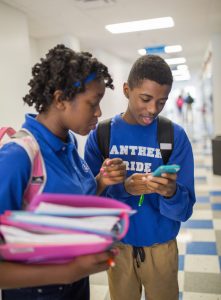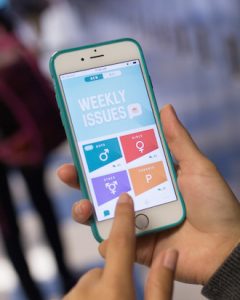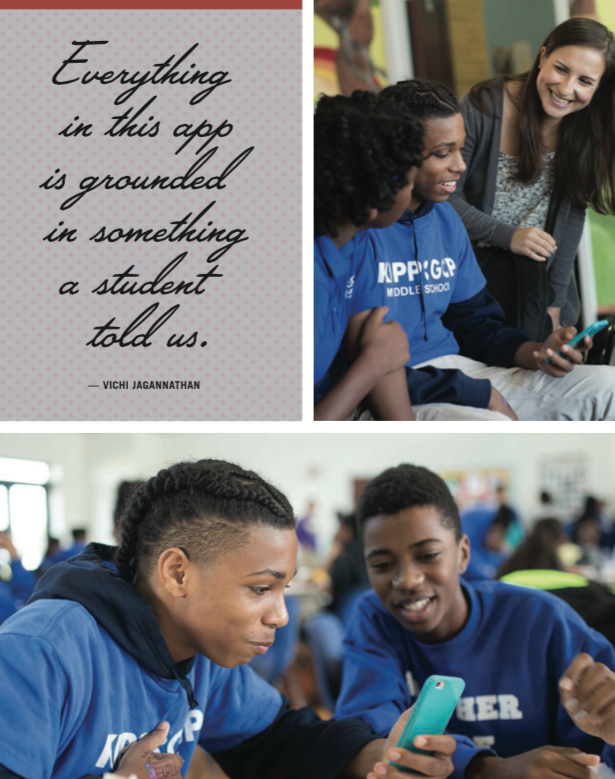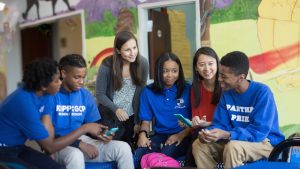And the winner is... an innovative sex ed app!
December 1, 2016
During spring and summer 2016, two Gillings School doctoral students, Elizabeth Chen and Cristina Leos, along with a Yale colleague, Vichi Jagannathan, set themselves an ambitious goal – to talk to more than 150 middle-school students about sexuality, self-image, changing bodies and relationships with peers. You know – the easy stuff.
“We had no idea if the students would talk to us,” says Chen. “We were strangers, after all. But they were completely willing to be open with us about everything.”

Abigail Roberts and Demonte Edwards compare their impressions of the Real Talk app. (Photo by Brian Strickland)
The team obtained permissions from the students and their parents, and then conducted several months of interviews with students. What they learned laid the groundwork for “Real Talk,” a sex-ed app that teaches kids about sexuality through storytelling.
The idea originated four years earlier, when Liz Chen began teaching science at a rural eastern North Carolina high school, through the Teach For America program. Vichi Jagannathan, a fellow Princeton alumna, coincidentally was teaching in the adjacent classroom. During their time at the high school, they saw many of their students struggling to cope with unplanned pregnancies.
After teaching, Jagannathan entered the Yale University School of Management, and Chen came to study health behavior at the UNC Gillings School – but they stayed in touch. After Chen met Cristina Leos, also in health behavior, the three women decided to join forces to transform health education for underserved middle-school students.
The idea for the “Real Talk” app began in 2016 when Chen, Leos and Jagannathan entered the Innovation Next competition, which challenges innovators across the country to find technology solutions that will redefine sex education for the 21st century.

A student interacts with the Real Talk app. (Photo by Brian Strickland)
“The three of us already had been communicating regularly about developing online sex-ed content,” says Jagannathan. “It seemed this program could take our idea to a different level.”
As one of the ten finalists in the competition, the team received $80,000 in development funds and the opportunity to collaborate with IDEO, one of the world’s premier innovation and design firms. IDEO’s “design thinking” methodology, which puts people’s needs at the heart of every design decision, was perfectly in line with the team’s vision for their app.
They set to work interviewing middle-school students and quickly made a discovery. Students are engaged by sex education when it is told in the form of stories from their peers, but much less interested when faced with a didactic curriculum involving diagrams of body parts and multiple-choice quizzes.
They also learned that middle school students, whether in rural eastern North Carolina or urban west Texas, all seemed to share a secret language of emojis (in which eggplants and peaches represent body parts) and neologisms (“cringey” was a favorite word to describe all manner of awkwardness). The students were eager to offer opinions on everything from font sizes to text colors to their preferences for buttons versus swiping.
“Every single design decision we made was informed by conversations with the students,” says Jagannathan. “Everything in this app is grounded in something a student told us.”

Chen and Leos also relied on their public health research to inform certain aspects of the app’s development.
“We know that teen brains have a hard time retrieving factual information in the heat of the moment,” Leos says. “But when they’re at that moment of making a decision, especially with their peers, they can retrieve stories.”
In August 2016, “Real Talk” received an additional $325,000 award from Innovation Next to make the app a reality. Chen, Leos and Jagannathan were the only student group that won. Their award is the largest award ever made to a student or student group at The University of North Carolina at Chapel Hill.
“I was gobsmacked,” says Julie MacMillan, MPH, managing director of Research and Innovation Solutions at the Gillings School. “I was surprised at the generosity of the cash, but not at all surprised that our students were doing that caliber of good thinking about problems. They are really exceptional inventors and creative thinkers.”

Innovation Next awardees Cristina Leos (standing) and Liz Chen (in red) meet with middle-school students to review a prototype of their app, Real Talk. Left to right are Abigail Roberts, Shamion Nelson, Leos, Desinea Watson, Chen and Demonte Edwards. (Photo by Brian Strickland)
The app isn’t intended to replace traditional sex education in schools, but it will provide a much-needed supplement to the standard curriculum.
“Teens love their phones,” says Chen, “but they don’t necessarily want to feel like they’re being taught something.”
With “Real Talk,” middle-school students can engage with sex-ed content in a way that feels much more like a conversation with a friend than would a facts-only pamphlet from the doctor’s office. At the same time, the content is 100 percent curated and aligned with national sexual education standards.
“We’re stealthy that way,” says Chen.
The “Real Talk” app is scheduled to be released in early 2018.
– Amy Strong
Carolina Public Health is a publication of the University of North Carolina at Chapel Hill Gillings School of Global Public Health. To view previous issues, please visit sph.unc.edu/cph.
